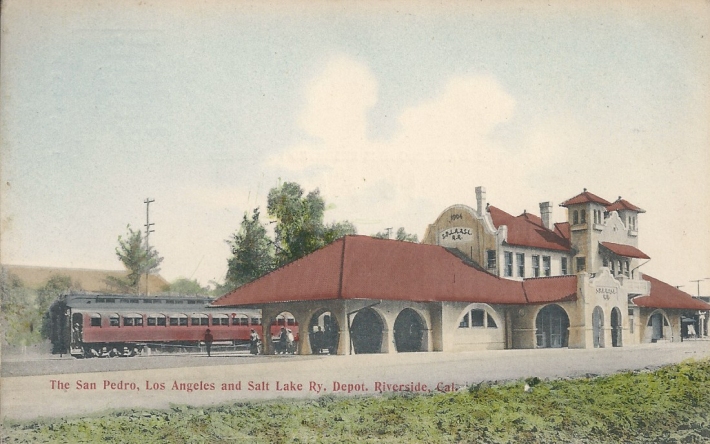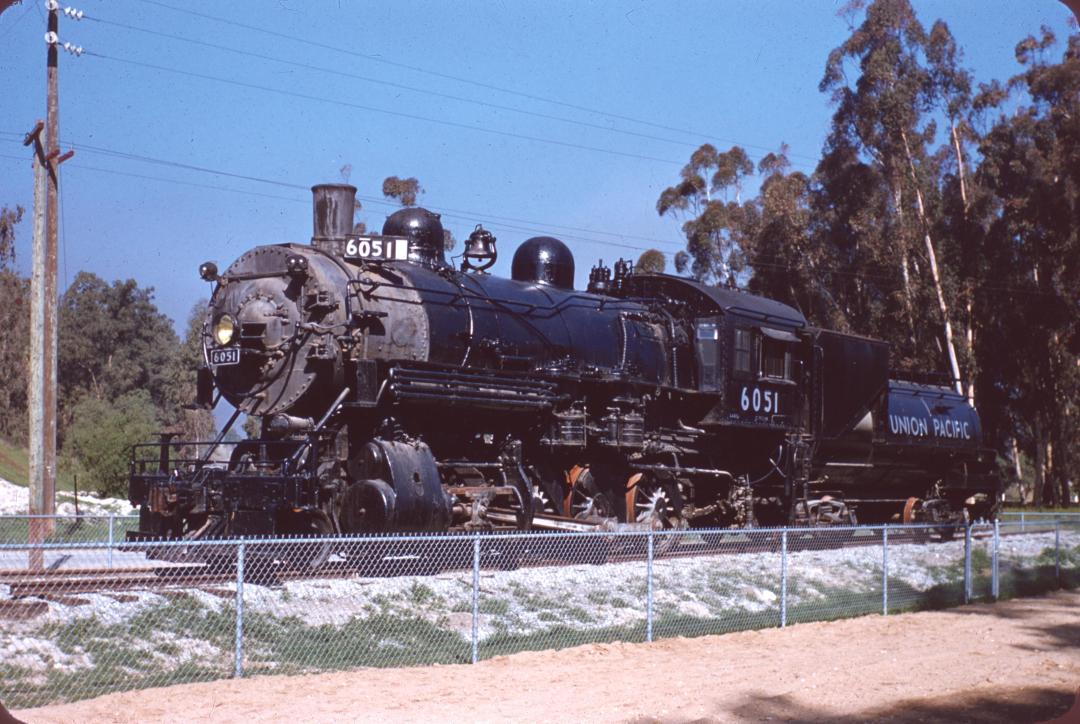Review: RCP's 'A Midsummer Night's Dream' Delivers Laughs Despite Traditional Approach
After 25-year Shakespeare hiatus, Riverside Community Players returns with a comedically strong but conventionally staged production.

Growing up in the 1950s I remember my first train set, a Lionel steam locomotive that I ran around an oval of track on a four by eight-foot sheet of plywood. That train, as did so many early toy trains for children, began a love of trains and railroading. No wonder that now having lived in Riverside for more than thirty years, I have found an interest in the early railroads that came to Riverside. One wonderful reminder of those glorious train days is still found in Fairmount Park, Union Pacific locomotive No. 6051. As one enters the city of Riverside from the north along Market Street, the train sits along the right side near one of the entrances to the park.
The engine is a reminder of the early history of railroading in Riverside. When the first San Pedro, Los Angeles and Salt Lake Route steam locomotive pulled into Riverside on March 12, 1904, with a special excursion train of passengers from Los Angeles, the train ushered in a new era of train service to Riverside. Riverside was then serviced by three major railroads: the Santa Fe, the Southern Pacific and the Salt Lake Route. The Salt Lake Route later became part of the Union Pacific Railroad. The era of railroad transportation was in full blossom.

Fifty years later, on March 14, 1954, the occasion was celebrated by the Southern California Chapter of the Railway and Locomotive Historical Society with another special excursion train of 550 passengers from Los Angeles to Riverside. The special train was pulled by Union Pacific 2-8-2 steam locomotive No. 2709. The trip was the last use of a steam locomotive on the Union Pacific’s southern division. After a stop at the famous concrete railroad bridge spanning the Santa Ana River at Anza Crossing for photo shoots, the train chugged into Riverside pulling up near Fairmount Park. There a diesel train, because of the sharp curves, had to pull the passenger cars unto the siding by the park. At the park the rail enthusiasts enjoyed a picnic lunch. The end of the steam era had come to Riverside on the Union Pacific.
On the day before this final run the editor of the Riverside papers, Howard H. Hays, wrote a very fitting tribute entitled The End of an Era. After reporting on the upcoming excursion train to Riverside where the passengers would enjoy a picnic lunch at Fairmount Park, Hays went on to further bemoan the passing of the steam era. Hays, however, had a compromising solution: bring one of these antique beasts to Riverside. He issued a direct challenge to the three railroads that served Riverside.
The Railway and Locomotive Society, Chapter of Southern California joined in the plea for a steam engine for Riverside. The challenge of the editorial by Hays was heard and the Union Pacific responded. They located a Los Angeles and Salt Lake Railroad Consolidation type locomotive, No. 6051. The Union Pacific offered to move this engine to Riverside and present to the city for display as requested.
The donated steam locomotive was built by Baldwin Locomotive Works in October of 1907. The engine is a 2-8-0 or Consolidation type. That means there are two wheels in front as pilot wheels, eight large driver wheels and no wheels under the cab. The eight drivers are 57 inches and produce a maximum traction force of 43,305 pounds. The engine and tender together are a little over 76 feet in length. It first was numbered No. 642 for the San Pedro, Los Angeles and Salt Lake Railroad and was used to haul freight between Salt Lake City and Caliente, Nevada. In 1916 it became No. 3642 for the Los Angeles & Salt Lake and finally No. 6051 in 1921 when the Union Pacific took over the line. Originally it was a coal burning engine but was converted to oil burning in 1924 when sent to Los Angeles for local service on the San Pedro and Anaheim branch. By 1947 the diesel had replaced almost all the steam locomotives in Southern California.
No. 6051 had ended up in Pocatello, Idaho, where it had been retired in February. Saved from the scrap heap the engine was sent from Idaho to the shops in San Bernardino, arriving there on July 4, 1954. At the shops in San Bernardino the crew meticulously went over the engine, servicing it, polishing it and working on it as if they were putting it back into service. They knew this might be one of the last steam locomotives to pull into their rail shops.
With everything moving so fast, quick preparations had to be made at Fairmount Park in Riverside. A location was chosen near the northeast entrance to Fairmount Park on Market Street, near where the old rail line went through the park to Crestmore Cement Plant
Monday, July 20 marked the first part of moving day for “Old 6051.” The engine and tender were brought over on the main line from San Bernardino pushed over by a UP diesel to the spur track adjacent to the California Electric Power industrial yard on Market north of First Street.
The next morning, Tuesday July 21, at about 8 a.m. the rails from the spur track were raised to bring them up to the bed of a heavy-duty truck with 42 tires on seven axles. First the engine and then the tender were pulled up on the truck beds. Moving over to the newly laid track in Fairmount Park the engine and tender were winched off the truck beds over slanted rail. Numerous spectators, young and old, cheered and then climbed all over the engine, welcoming the locomotive to Riverside. “Old 6051” had a new home.
The official welcome and dedication took place a week later, on Tuesday, July 27. Mayor E. V. Dales was the master of ceremonies. Officials from the Union Pacific Railroad and from the Southern California Chapter of the Railway and Locomotive Historical Society also were present and spoke. Officials offered special tribute to Howard H. Hays, president and editor of the Riverside Press and Enterprise for his efforts starting with an editorial that were responsible for this project. Hays unfortunately was out of town for the dedication.

Throughout the years “Old 6051” has stood welcoming people as they entered the city from the north along Market Street. The locomotive has been repainted several times and a new fence installed. Admired by thousands, the engine has served as editor Howard Hays foretold a reminder of bygones age, memorializing the great age of steam for future generations.
Information for this article was taken from “The End of an Era Produces a New Era,” a chapter in the book Celebrating 150 Years of Riverside published in 2020 by the Riverside Historical Society.
Let us email you Riverside's news and events every Sunday, Monday, Wednesday, and Friday morning. For free